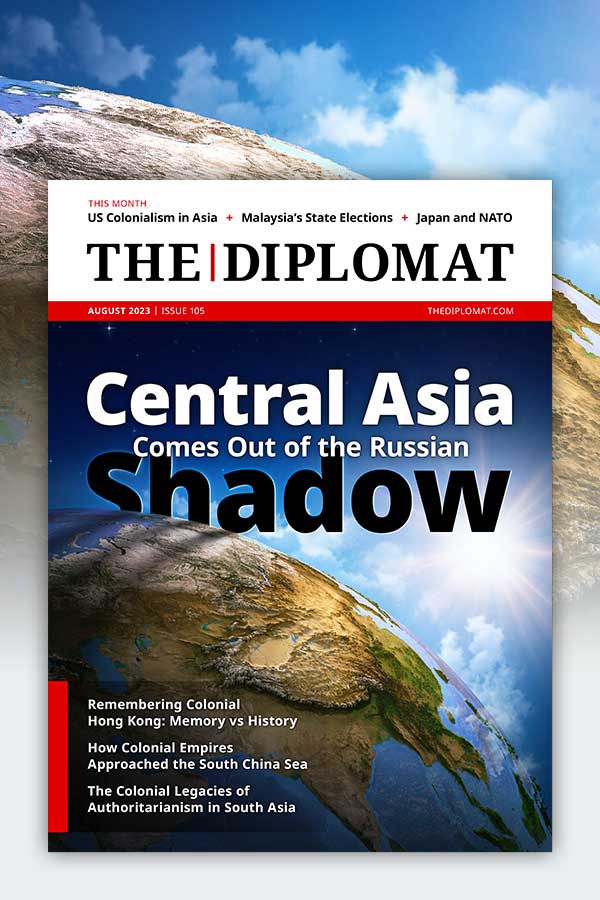| Welcome to the latest issue of Diplomat Brief. This week our top story looks at the Nepali contractors caught up in the U.S. evacuation of Kabul. We also have an interview with Dr. Tim Rühlig, senior research fellow at the Center for Geopolitics, Geoeconomics, and Technology of the German Council on Foreign Relations (DGAP) in Berlin, on Germany’s new China strategy. |
| Story of the week | ![[object Object]](https://thediplomat.com/diplomat-brief/2023/vol35/images/feature.jpg) | Security The Nepali Guards Caught in the Chaotic US Evacuation of AfghanistanWhat Happened: In mid-August 2021, as the Taliban seized control of Kabul, the United States scrambled to get its remaining troops, diplomats, aid workers, and as many Afghan allies as possible out of the country. Among those caught in the chaos were thousands of Nepalis who had been employed as security contractors, tasked with guarding the lives of Americans in Afghanistan. Our Focus: Around the time of the evacuation, the U.S. was employing around 16,000 foreign nationals in Afghanistan. Hired through private contractors, these workers provided support and security for U.S. operations – and many of them came from Nepal. Given their indirect employment relationship with the U.S. government, Nepalis were left in the dark as the fall of Kabul loomed. “I heard that the Taliban had captured different cities and U.N. compounds where Nepalis were working; and that in one or two days they would reach Kabul,” one guard recalled in an interview with The Diplomat. Another recounted seeing the Taliban march toward the embassy amid gunfire: “I knew then that the evacuation was starting.” What Comes Next: The Nepalis were successfully evacuated from Afghanistan, via a lengthy journey that involved stops in Qatar and Kuwait. But two years later, many are still suffering financial hardship from the sudden loss of income that came with the evacuation – and the end of their employment. Several of the guards interviewed explained that they are struggling to pay for housing costs and their children’s education. The entire episode shines light on the shadowy military contracting industry – and why so many Nepalis sign up for hazardous duty protecting foreigners overseas. Read this story |
| Behind the News | INTERVIEW Tim RühligDr. Tim Rühlig, senior research fellow at the Center for Geopolitics, Geoeconomics, and Technology of the German Council on Foreign Relations (DGAP) in Berlin, compares Germany’s China strategy to the EU’s: “at first glance, Germany’s China strategy simply adopts the EU’s three-sided approach of China as a partner, competitor, and systemic rival. But in contrast to the EU, Germany is explicit in stating that the elements of competition and rivalry are getting more and more prominent.” Read the interview |
| This Week in Asia | Northeast Asia Fukushima Wastewater Release Roils China-Japan RelationsLast week, Japan began a long-planned release of treated – but still radioactive – wastewater from the wrecked Fukushima nuclear plant into the Pacific Ocean. The move sparked controversy and fear in Japan and neighboring South Korea, as well as the Pacific Islands. But no country has reacted more strongly than China, which immediately banned all seafood imports from Japan. Tokyo is now complaining about targeted harassment of its embassy and Japanese businesses within China, fueled by a fearmongering state media campaign. Find out more | South Asia Pakistan’s Imran Khan Acquitted – For NowImran Khan, Pakistan’s embattled former prime minister, was acquitted of corruption charges on Tuesday, the latest development in a back-and-forth legal battle that has seen Khan in and out of prison. As it stands, the ruling would free Khan to contest in coming elections, although he still faces numerous other charges in separate cases. But few expect the powerful military to allow Khan to actually compete in the polls. Find out more | Southeast Asia Singapore Heads to the PollsOn September 1, Singaporeans will vote to select who will succeed Halimah Yacob as the country’s next president, a largely ceremonial post. Just three candidates have managed to surmount the city-state’s stringent eligibility criteria, which require presidential candidates to have served as a senior civil servant or to have a strong record in the private sector. Tharman Shanmugaratnam, a former senior minister and the de facto preference of the ruling People’s Action Party, is competing against Ng Kok Song, an ex-chief investment officer of the sovereign wealth fund GIC, and Tan Kin Lian, the former head of the insurance company NTUC. Find out more | Central Asia Kyrgyzstan's Kloop in the CrosshairsKloop, a well-respected independent media outlet in Kyrgyzstan, is the latest to face a legal challenge from the government. This week, Kloop was notified of a claim made by the Prosecutor’s Office in Bishkek calling for the liquidation of the organization on the grounds that its activities “exceed the scope provided for by its charter.” But the main complaint is the “negativity” of its coverage of the government. If the news is bad, Bishkek apparently doesn’t want to hear it. Find out more |
| Visualizing APAC |  | Taliban border guards in a rudimentarily fortified position in the Tangshew valley, one of the most remote postings in an already remote region, Maimai District, Badakhshan, Afghanistan. See the full picture |
| Word of the Week | Society HujraArabic for “cell” or “room,” in Uzbekistan the term refers to underground – and illegal – schools providing instruction in Islamic teachings. Find out more |
|  |

![[object Object]](https://thediplomat.com/diplomat-brief/2023/vol35/images/feature.jpg)

